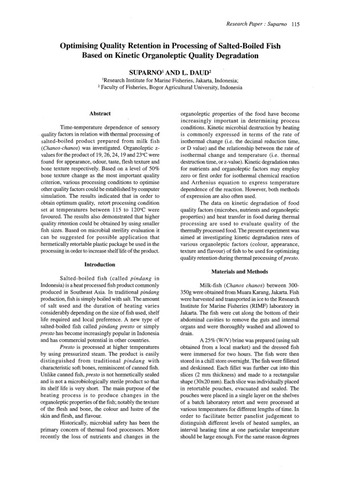Optimising quality retention in processing of salted-boiled fish based on kinetic organoleptic quality degradation
Share
Abstract
Time-temperature dependence of sensory quality factors in relation with thermal processing of salted-boiled product prepared from milk fish (Chanos-chanos) was investigated. Organoleptic z-values for the product of 19, 26, 24, 19 and 23°C were found for appearance, odour, taste, flesh texture and bone texture respectively. Based on a level of 50% bone texture change as the most important quality criterion, various processing conditions to optimise other quality factors could be established by computer simulation. The results indicated that in order to obtain optimum quality, retort processing condition set at temperatures between 115 to 120°C were favoured. The results also demonstrated that higher quality retention could be obtained by using smaller fish sizes. Based on microbial sterility evaluation it can be suggested for possible application that hermetically restorable plastic package be used in the processing in order to increase shelf life of the product.
Suggested Citation
Suparno, & Daud, L. (1997). Optimising quality retention in processing of salted-boiled fish based on kinetic organoleptic quality degradation. In K. K. Hooi, L. K. Low, & P. Y. Lim (Eds.), Proceedings of the seminar on the advances in fish processing technology in Southeast Asia in relation to quality management, Singapore, 29 October - 1 November 1996 (pp. 115-119). Singapore: Marine Fisheries Research Department, Southeast Asian Fisheries Development Center.

